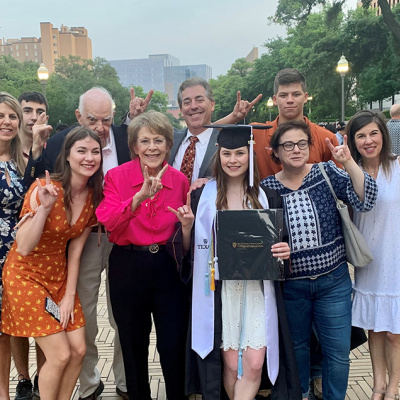Meet Author Bret Anthony Johnston, the Michener Center's New Director

When a new group of writers descends upon the J. Frank Dobie house this August, a new director will greet them. Following in the footsteps of James Magnuson, who retired in the spring, Bret Anthony Johnston began as director of the Michener Center for Writers this summer. He hails from Harvard University’s creative writing program, where he’s been the director for the past 11 years, and is the author of the best-selling novel Remember Me Like This and the award-winning Corpus Christi: Stories. He also wrote and directed the documentary film about skateboarding, Waiting for Lightning. The recipient of numerous literary awards, including the 2017 Sunday Times EFG Short Story Award, he grew up in Corpus Christi and has been an avid skateboarder for over 30 years. We caught up with Johnston as he prepares for the upcoming semester.
How does coming to the Michener Center feel?
It’s a dream job. I had a great job at Harvard, and I really couldn’t imagine a job that would pull me away from what I had up there because I really was in a fortunate position. Then, out of nowhere, this opportunity comes up, and it really does feel like a dream. Not only are you working with the world’s best and most promising aspiring writers, you’re surrounded with the world’s most accomplished writers and teachers of writing. The Michener Center seems to inspire this feeling of shared enterprise, this feeling of what we’re doing matters and we’re all in it together. It’s a very rare thing, especially in our country, where writing really doesn’t matter to a lot of people. A lot of people think of writing as an indulgence, but really it’s the furthest thing from that. So to come to The University of Texas, a university that understands how important the making of literary art is, that feels like a gift unto itself.
What do you mean writing is the furthest thing from an indulgence?
There are plenty of better ways to make money than being a writer. There are countless ways that the world is going to make it really easy for writers to do anything other than write. So what we wind up doing is giving up indulgences as writers. We decide we’re not going to go for the highest paying job. We’re not going to take as long of a vacation as all of our friends do. We’re not going to go see the newest movie. We’re going to stay home alone in our room with 26 letters and their infinite combinations, and we’re going to try to make sense of the world that way. We’re giving up the lake house—all these things that matter to everybody else, because what matters to us is what we can create on the page. It’s a feeling of giving up indulgences rather than indulging ourselves.
Why do you think a lot of people do see writing as an indulgence?
Our culture prioritizes a kind of progress that we can see and a progress that is quantifiable, where there’s a fairly reliable and proven path toward whatever the end goal is. With writing, it’s up to the individual writer to forge that path. That’s a very hard thing to rely on. It’s a hard life to endorse if you’re not the writer, like if you’re someone worrying about your kid finding a job. We obviously live in a capitalist culture, and it’s not a reliable profession, but it is a valuable profession. It is a dignified way to spend your time, but often the focus is on what we can make as opposed to how much money we can make, and that isn’t easy to reconcile in a capitalist society.
As the new director, what do you hope to accomplish?
I have a lot of goals. I want to build on the vision that Mr. Michener had for the program. I want to carry the torch that Jim Magnuson has been carrying for the last 23 years. I want to ensure that all of the students coming to the Michener Center have a safe writing space where they are encouraged to take risks with their work. I think that’s going to be the key. If we’re just teaching them to do what has been done before, we’re not enlarging the scope of literature. We are not giving them the tools that they need to follow their own curiosity into the books and plays and screenplays that only they can write. We have to make sure that they feel safe and make sure that they feel allowed to experiment, to fail, to try again, to risk what no one has risked before them.
Where does your passion for skateboarding come from?
I’ve been skateboarding pretty much non-stop since I was 14 years old, and I certainly see a lot of similarities between skating and writing and skating and teaching. Skateboarding requires the same level of dedication, the same level of perseverance and patience, that writing does. When I’m trying to learn a new trick, it feels exactly the same as when I’m trying to finish a sentence. There’s an urgency to it and there’s a sense of not wanting to stop until you get it right. Sometimes it happens very quickly and sometimes it takes hundreds if not thousands of attempts. But it’s a lot less painful to take a sentence through multiple drafts than it is to fall to the bottom of a drained swimming pool.
What would you say is your best piece of writing advice?
I think what comes to my mind is to write what matters to you, to write the poem or the story or the novel or the play or the screenplay that you would want to read or see. Trust that your own curiosity is going to find a reader with the same curiosity.
How does where you come from influence your work?
Most of what I’ve published has taken place in and around the area of South Texas, where I grew up. I continue to be interested and invested in the lives and the characters and the stories that can come out of that area that haven’t been told. Another way that it’s influenced me is that, in that part of the country, reading and writing aren’t a priority. I was 21 years old before I ever laid eyes on a living, breathing writer. It’s a strange and sad, and perhaps darkly funny, thing to say, but until I was 21 years old, I didn’t really understand that you could still be a writer. I didn’t understand that that was still available in the world. I grew up in a family that loved to read. My parents were always reading, and so I always loved to read, and I always loved to write my silly little stories and poems, but I didn’t understand that they would matter to anyone else. I didn’t know that there were writers in the world, so I think the way that where I come from continues to influence me is that I don’t take this life for granted. I don’t in any way take it as a given that someone is going to want to read something I’ve written. I come at writing and I come at the teaching of writing in a very blue-collar way. I think the way that you succeed in this vocation is to roll up your sleeves and go to work every morning. I don’t buy into the idea of the muse or inspiration or writer’s block. I think you show up to work, you do your work and if you show up long enough, the work will get done.
Have you met other writers who have a similar mentality, that writing is a blue-collar endeavor?
Of course there are. That said, I see far more writers, some of whom are just starting out and some who are very very successful, who tend to give up earlier than it would ever occur to me to give up. There’s a certain lack of patience at play in a lot of writers’ lives. I think one of the things that I try to do as a teacher and certainly as a program director is to teach patience and to teach resilience and to trust the process, to trust the labor, and to see this enterprise as a vocation in the truest sense of the word. Most of the time when you hear the word vocation, you think of a job and it is true. The word vocation also means a calling, and I think where those two definitions meet is where you find the most exciting writers. The writers who do see it as a kind of labor. It is a daily habit. It is labor. On the other hand it’s also a calling. There are very few people who are going to feel the need to lock themselves in a room, making up characters who don’t exist or struggling with a line of poetry. But for the people who do receive that call and can couple that with the daily labor, those are the writers who are going to shape our reading culture. I think that’s a lot of what the Michener Center does. It shows them ways of lasting.
In your opinion, what is the value of getting an MFA degree?
I think getting an MFA degree from the Michener Center for Writers should prove to be a transformative experience for the fellows because they are going to have access to writers and teachers who really can mentor them in ways that other programs don’t necessarily invite. Other programs are so much bigger, and the students don’t have such intense and intimate access to the faculty. At the Michener Center, all we care about is the writer and the writing. We are going to do our best to find ways to augment their imagination and cultivate patience and perseverance, and we are going to surround them with other writers who are as gifted and as serious as they are. That’s the rare gift. For three years, they are going to feel less alone to the world. Writers feel marginalized in our society. So to give them three years where they feel part of a shared enterprise, where they feel part of a community of like-minded individuals, that is going to give them confidence. It should be invaluable, and if they aren’t better writers by the time they leave the program, then I failed them, and I’m going to work my tail off not to fail them.






